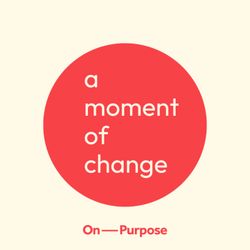Latest episode
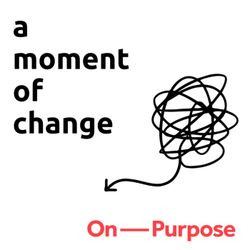
Trailer: a moment of change
00:42||Season 1, Ep. 0Welcome to 'a moment of change'. Brought to you by On Purpose London.
More episodes
View all episodes

1. Mutual aid: Helping each other through COVID-19
53:04||Season 1, Ep. 1With the outbreak of COVID-19, we’ve seen the genesis of a new wave of informal mutual aid groups across the country, pooling volunteers and resources within local communities to help one another through a time of crisis. Could the global pandemic be a turning point in our connectedness to our communities, and to our neighbours in need? <br/>"For a while, people stopped fighting about the normal things they fight about, and just had to get on with it."<br/>In this episode we speak to Cathy Wang, Lily McConnell, and Blake Murphy, three London residents who became organisers of mutual aid in their communities. They tell us why they got involved, their successes and challenges, stories from their local areas, and what makes them hopeful for the future.<br/>Useful links: Listeners in the UK can find mutual aid groups operating in their local communities at https://covidmutualaid.org ThirdSector article https://www.thirdsector.co.uk/analysis-does-mutual-aid-mean-charity-sector/volunteering/article/1683331Cathy’s article https://medium.com/mutual-aid-as-a-startup/5-community-care-lessons-in-covid-6d4f452db755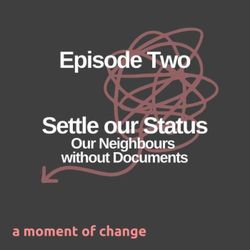
2. Settle our Status: Our Neighbours without Documents
36:16||Season 1, Ep. 2In this episode, we speak to Bilqis and Elsie, leaders working with Citizens UK on the Settle Our Status campaign to settle the immigration status of our neighbours without documents in the UK, giving them access to full participation in public life, in the economy and in their communities.<br/>Useful links:Settle our Status campaign video: https://settleourstatus.org/Read the open letter to Boris Johnson: https://settleourstatus.org/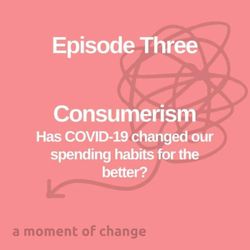
3. Consumerism: Has COVID-19 changed our spending habits for the better?
49:23||Season 1, Ep. 3Social isolation has given us reason to reflect and reevaluate many things – not least our consumer habits, and the impact our purchases have on the planet and on humanity. During this episode we’ll be speaking to three guests leading the charge on sustainable living to understand more about the impact of COVID-19 on our spending habits, both good and bad, and more crucially whether we expect these changes to continue into the future. <br/>Our speakers are Natasha Parker, Head of Compassion Not Consumerism at Global Action Plan, Jarvis Smith co-founder of My Green Pod and Sarah Divall, a creative partner at the environmental charity Hubbub.<br/>Useful links:Don’t Change video: https://youtu.be/4OmBVeewmjYGlobal Action Plan film mentioned by Natasha: Flickers of the Future https://www.globalactionplan.org.uk/compassion-not-consumerism/flickers-final-fiveCampaign to Stop Targeted Advertising to Kids https://www.globalactionplan.org.uk/compassion-not-consumerism/stop-targeted-advertising-to-kidsGet My Slice: https://getmyslice.page.link/yDtq3mhM683hVD6d6<br/>Books mentioned:Humankind by Rutger Bregman https://www.bloomsbury.com/uk/humankind-9781408898932/How Bad Are Bananas? : The carbon footprint of everything by Mike Berners-Lee https://www.hive.co.uk/Product/Mike-Berners-Lee/How-Bad-Are-Bananas--The-carbon-footprint-of-everything/24708373 Drawdown : The Most Comprehensive Plan Ever Proposed to Reverse Global Warming by Paul Hawken https://www.hive.co.uk/Product/Paul-Hawken/Drawdown--The-Most-Comprehensive-Plan-Ever-Proposed-to-Re/21910985The Fragile Earth: Writing from the New Yorker on Climate Change https://harpercollins.co.uk/products/the-fragile-earth-writing-from-the-new-yorker-on-climate-change?variant=32600769232974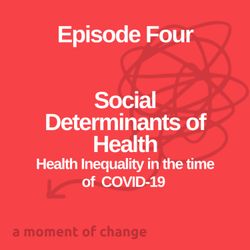
4. Social Determinants of Health: Health inequality in the time of COVID-19
47:43||Season 1, Ep. 4Since The Marmot Review in 2010, it has been widely accepted that variance in social factors (education, housing, employment and discrimination) lead to variance in health outcomes. A recent review has shown that improvements in life expectancy have been flatlining in the UK during a period of austerity - for the first time since 1900. In this episode we discuss with the leader of a community health organisation his journey in supporting the Caribbean and African community in Manchester and how his work has been impacted by COVID-19.Our guest speaker is Rev Charles Kwaku-Odoi. Alongside his role as Chief Officer for CAHN, Charles co-leads Command Prayer Centre Ministries International and co-chairs Faith Network for Manchester. He specialises in engaging with the Black community in the Diaspora, and also works closely with Terrence Higgins Trust in their delivery of HIV Prevention England.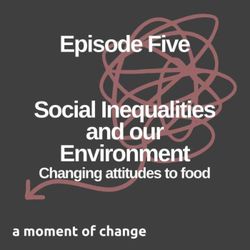
5. Social Inequalities and our Environment: Changing Attitudes to Food
33:33||Season 1, Ep. 5The COVID crisis has further exposed social inequalities and environmental concerns. It has highlighted the demand on food banks, the reliance of many families on school meals and the fragility of our food systems. On the flip side, more people are talking about climate change, food waste and the benefits of growing food at home. In this episode we talk to Carly Trisk-Grove: restaurateur, B Leader and co-creator of a new restaurant concept focused on serving tasty, nourishing food at an accessible price and inspiring a generation of change-makers to level-up their own communities.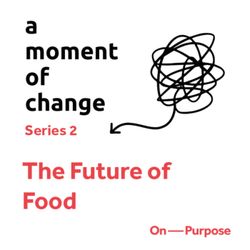
1. The Future of Food: Reaching a truly sustainable food system
31:01||Season 2, Ep. 1Food affects all areas of life - it drives our bodies, our communities and our politics. The food system is complex, nuanced and powerful, but in this changing environment it can be difficult for us to understand how to move towards a truly sustainable system.In this episode, we speak to India Langley, Head of Communications at LettUsGrow to consider what a sustainable and healthy diet actually looks like, and what we can do to actually get there, both as individuals and as a society? Join us to learn about the future of food, and how technology and community can help us achieve a more sustainable, edible future.Useful links:LettUsGrow: LettUsGrowHow much land is used for agriculture: https://ourworldindata.org/land-use Sustainability of vertical farming: https://www.eitfood.eu/blog/post/is-vertical-farming-really-sustainable GHG emissions greenhouse vs plant factory (vertical farm): https://www.researchgate.net/publication/321379221_Plant_factories_versus_greenhouses_Comparison_of_resource_use_efficiencyWater usage in agriculture: http://www.fao.org/3/cb1447en/cb1447en.pdf Agriculture number one cause of deforestation: https://wwf.panda.org/discover/our_focus/forests_practice/deforestation_causes2/forest_conversion/Deforestation the largest GHG emission source in the food-system: http://www.fao.org/news/story/en/item/1402118/icode/The planetary health diet: https://eatforum.org/learn-and-discover/the-planetary-health-diet/
